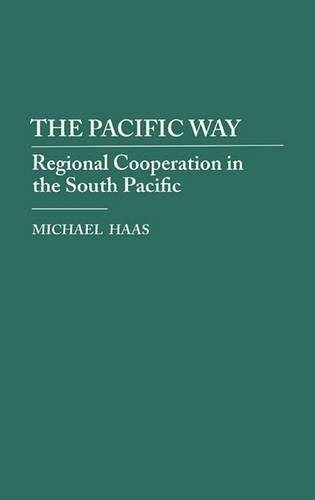
The Pacific Way: Regional Cooperation in the South Pacific
(Hardback)
Publishing Details
The Pacific Way: Regional Cooperation in the South Pacific
By (Author) Michael Haas
Bloomsbury Publishing PLC
Praeger Publishers Inc
4th April 1989
United States
Classifications
Tertiary Education
Non Fiction
337.19
Physical Properties
Hardback
205
Description
This insightful book shows how the cultural affinity among the island nations of the South Pacific, known as the Pacific Way, has led to unique regional intergovernmental organizations. In particular, Haas points out that the survival and vitality of regional cooperation in the South Pacific is pivoted on this peculiar cultural affinity. He claims that organizations who have not adopted the Pacific Way have collapsed, while those that embrace it survive and will continue to grow. This politically oriented book, which covers Hawaii and the island nations from Pitcairn Islands on the east to Palau and Papua New Guinea on the west, from Micronesia on the north to Australia and New Zealand on the south, offers a perceptive view of this much ignored region of the world. The Pacific Way examines specific organizations in this political culture, revealing how individual countries have developed common institutional arrangements in accordance with the Pacific Way. Haas starts with the organizing efforts of the colonial powers in the region, and goes on to provide a complete history of intergovernmental organizations. He offers pertinent information of the South Pacific Commission, ANZUS, and the South Pacific Forum. He fully describes the more technical organizations, including the Pacific Forum Line and the University of the South Pacific--providing both historical and contemporaruy perspectives. Finally, in view of the formation of the subregional Melanesian Spearhead Group and discussion on a possible Polynesian Economic and Cultural Community, The Pacific Way addresses prospects for integration of South Pacific regional organizations into a single coherent structure. It will appeal to students and scholars interested in political anthropology, theories of regional cooperation, and the politics of the region. It will also prove invaluable to business executives and foreign officials who deal with this part of the world.
Reviews
The independent Pacific island nations are the least known of the over 100 new decolonized countries since WWII. These Oceanic nations gained independence by peaceful means. This is partly due to cooperation of regional organizations. Some nations predate independence, some ceased after independence, many originated with decolonization. Haas describes all of them with good documentation. This work is a solid contribution to the scarce literature of the new South Pacific. The title is taken from a little-known 1976 Fijian publication, The Pacific Way. To Haas this now means a new form of international interaction--a refreshing contribution to theories of regional cooperation.' Chapter 9 about Hawaii's contribution is to be noted. Studies about international organizations are not easy reading. This book must be highly recommended to anyone interested in the new South Pacific. Tables, figures, list of abbreviations, notes, and bibliography are useful. For undergraduate and graduate students as well as general readers.-Choice
"The independent Pacific island nations are the least known of the over 100 new decolonized countries since WWII. These Oceanic nations gained independence by peaceful means. This is partly due to cooperation of regional organizations. Some nations predate independence, some ceased after independence, many originated with decolonization. Haas describes all of them with good documentation. This work is a solid contribution to the scarce literature of the new South Pacific. The title is taken from a little-known 1976 Fijian publication, The Pacific Way. To Haas this now means a new form of international interaction--a refreshing contribution to theories of regional cooperation.' Chapter 9 about Hawaii's contribution is to be noted. Studies about international organizations are not easy reading. This book must be highly recommended to anyone interested in the new South Pacific. Tables, figures, list of abbreviations, notes, and bibliography are useful. For undergraduate and graduate students as well as general readers."-Choice
Author Bio
MICHAEL HAAS is Professor of Political Science, University of Hawaii at Manoa. He has been studying regional cooperation in the Third World for two decades. He has written several books on political organizations including International Organization, International Systems, and Basic Documents of Asian Regional Organizations.
